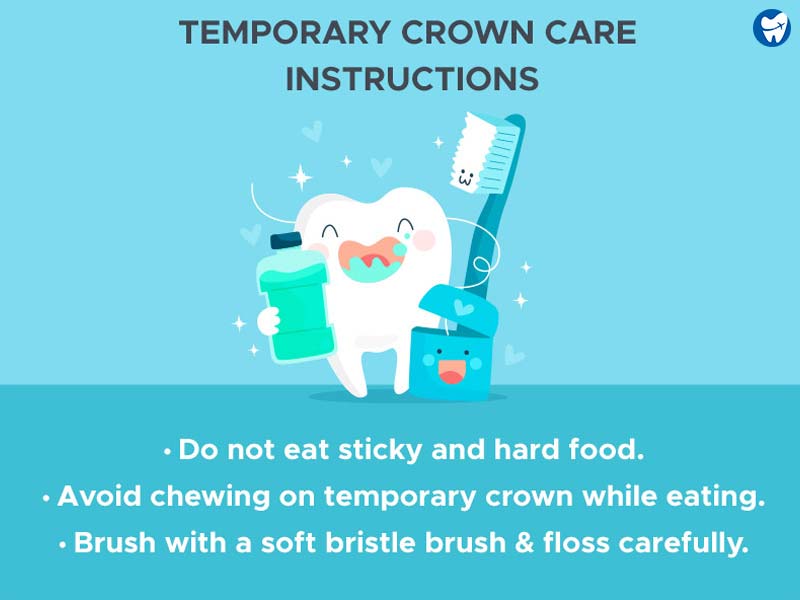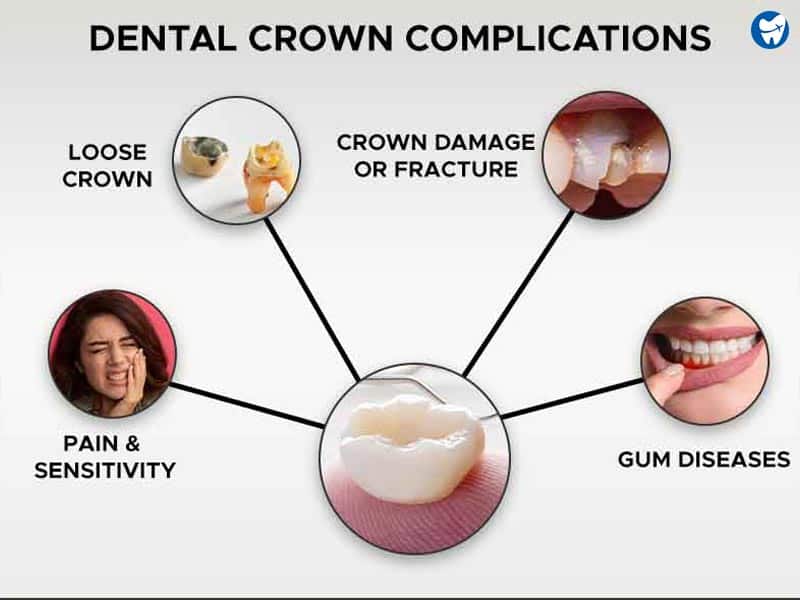Dental crowns are caps that surround your natural tooth - an excellent option for restoring damaged ones. Your tooth is trimmed down to form an anchor post on which a crown is placed.
Taking good care of tooth crowns keeps them strong and long-lasting. So, here’s an essential guide to help you!
Dental Crown After Care
Aftercare of Temporary Dental Crowns
Your dentist will place a temporary crown on your prepared tooth while your permanent one is fabricated in the lab.
This helps protect your tooth and allows you to eat and speak normally.
Temporary dental crown care is essential since they are more fragile than permanent crowns.
Therefore they need special attention. Here are some instructions to maintain them.
How To Maintain a Temporary Dental Crown?
If your temporary crown comes off or gets damaged, visit your dentist immediately to get it fixed.
Do not wait till your next appointment. Delaying this can result in the permanent crown not fitting properly.
Aftercare of Permanent Dental Crowns
A permanent dental crown is tough and durable, just like your natural tooth.
Good oral hygiene habits like regular brushing, flossing, and mouthwash are crucial for maintaining your dental crown.
Visit your dentist regularly for evaluation as well.
How to Floss a Dental Crown & Bridge
Video Courtesy – Dental Solutions Algodones
Generally, dental crowns are made of ceramic or have a ceramic outer layer. It is a strong and color-stable material.
However, there is a risk of fracture if there is excessive pressure. The natural tooth supporting the crown has been trimmed and, therefore, not as strong.
Fracture of the supporting tooth may need extraction. Hence avoid chewing very hard food from the side of your permanent crown.
What Should You Avoid After Getting a Dental Crown?
After placing a dental crown, it may take a few days for your gums to heal completely.
To prevent the occurrence of any pain or damage due to the crown, you should avoid a few things like: [1]
- Eating solid food immediately after placement of the dental crown
- Chewing from the side of the crown before the underlying cement is set
- Eating hard and crunchy food within a few days after the procedure
- Lifting the floss vertically while flossing, which may dislodge the crown
- Tolerating persistent pain due to an ill-fitting crown
Any of the habits mentioned above can lead to failure of your dental crowns and can result in further complications.
Follow the above-mentioned dental crown aftercare guidelines to avoid any complications.
How to Avoid Stains on Dental Crowns and Bridges?
Here are a few useful tips to avoid stains on dental crowns and bridges.
Tips To Avoid Stains on Dental Crowns & Bridges
Care for your crowns, your smile is precious!
Get best tipsDental Crown Complications
Even after following proper oral care guidelines, sometimes you may experience complications. Common problems associated with dental crowns are: [2]
Teeth Crown Complications
It is normal to experience sensitivity for a few days after the crown placement. But, persistent discomfort or pain on biting needs to be evaluated.
Visit your dentist to get it fixed. Sometimes only a quick, simple adjustment is needed.
Sometimes, your crown may get loose and fall off. This happens due to excessive biting pressure or washing away dental cement and is also seen in old dental crowns.
If your dental crown gets detached, it’s essential to seek professional help immediately.
Dental crowns can become chipped or fracture from the high biting pressure. [3]
Minor chipping can be repaired, but the fracture needs crown reconstruction.
Dental crowns with poor oral hygiene can lead to inflammation of the gums. [4] This inflammation can result in gingival recession, affecting a dental crown's appearance.
Poor hygiene can also lead to decay around the edge of the crown. This can cause the crown to leak and allow bacteria to damage the natural tooth supporting it.
Generally, a dark line seen around the dental crown is due to gingival recession. [5]
Conclusion
The lifespan of your dental crown depends significantly on its aftercare.
With proper oral care, maintenance of good oral hygiene, and regular dental checkups, these crowns can last for a lifetime.
Knowing how to care for your dental crowns and following aftercare instructions for a dental crown is essential for maintaining dental crowns in good shape.
FAQs
You have to care for your crowns the same as your natural teeth. These simple dental crown care instructions can make them last a long time.
- Brush twice daily
- Floss twice daily to remove food deposits
- Avoid chewing hard and sticky food
- Visit your dentist regularly
Yes, your dental crowns are placed over natural teeth, which need regular care and maintenance.
You need to brush twice daily, just like your natural teeth. Removing food debris and plaque is essential to maintain your dental crowns to help them last longer.
Generally, dental crowns last for 10 years. However, dental crowns' lifespan depends on oral care and maintenance.
Maintaining good oral habits and avoiding wear and tear of your crown can help them last longer. [6]
Poor oral hygiene and plaque build-up can be one of the reasons for the bad smell under your crown.
If your crown margins are not sealed properly, it leads to plaque build-up and decay. This decay and seepage of bacteria under your dental crown can result in a bad smell.
Manual brushing and flossing are enough to clean all the areas around your dental crown.
Brush twice daily, use mouthwash and dental floss to clean thoroughly as you do with your natural teeth.
Yes, bad oral hygiene and plaque build-up can result in the decay of the underlying tooth. If plaque is not removed, the bacteria can leak under the crown and harm the natural tooth.
This compromise can allow decay to reach the nerve of the tooth, fracture the tooth, or cause the crown to become loose.
Your dental crown is placed around your natural tooth, hence maintaining your oral hygiene is crucial for the maintenance of the dental crown.
If you have a metal-based porcelain crown or metal crown, and the gum around your crown recedes, the metal will start to show.
This forms a black line around your crown. It just represents the junction between the crown and the tooth.
If you want to get rid of this black line, you can replace your crowns with all-porcelain crowns.
Biting hard food causing fracture or decay of the underlying tooth can result in pain of the crowned tooth.
You should consult your doctor immediately if you experience such pain.
Permanent crowns are strong and resilient like natural teeth. However, you should avoid eating sticky and hard food, putting excessive pressure on the crown and supporting tooth.
Foods to avoid while having permanent crowns are;
- Ice cubes
- Sticky food
- Nuts and popcorn
- Hard and crunchy food
In rare cases, the vibrations of an electric brush can loosen the dental crown.
You should consult your dentist if you use an electric brush.
No, they do not loosen crowns. Waterpiks are a great choice to clean inaccessible areas around crowns and implants.
It releases water at high pressure, which reaches all narrow spaces that brush and floss can’t reach.
Although ceramic crowns are stain-resistant, over time, they may get discolored.
Excessive consumption of dark-colored drinks like coffee can stain your crown. Hence, moderate consumption of these beverages is recommended.




